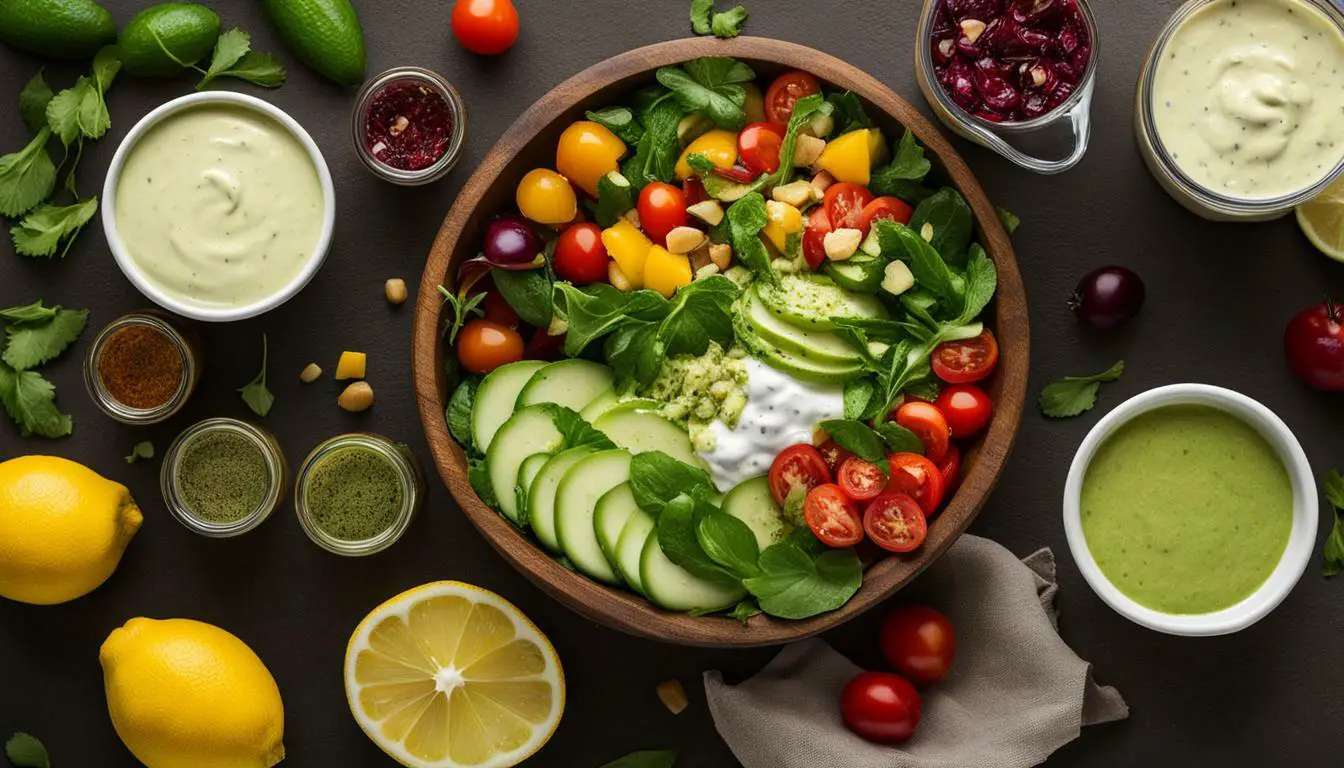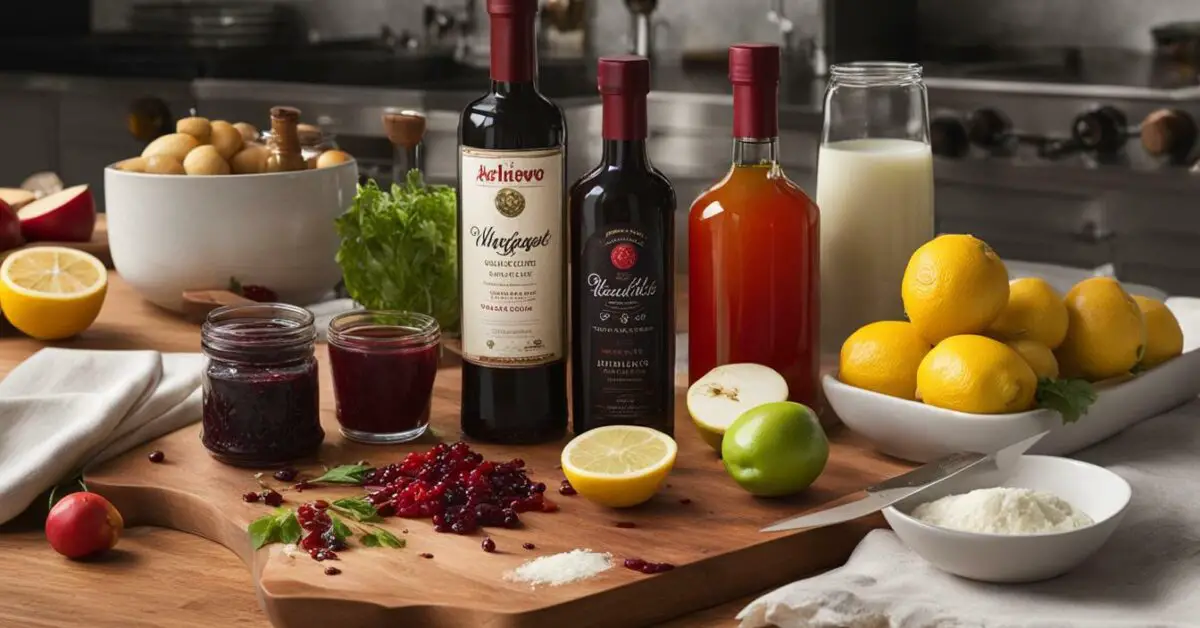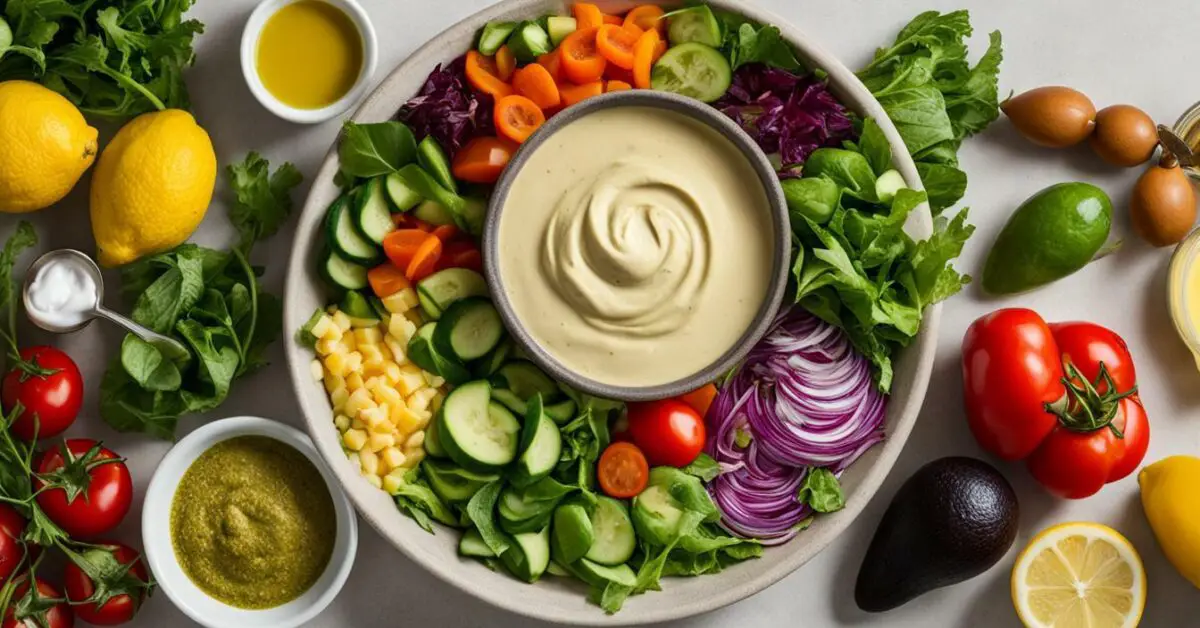
This post may contain affiliate links. Please read my disclosure for more information.
When it comes to substituting vinegar in salad dressings, there are several options available. Whether you’re looking for an alternative to balsamic vinegar or searching for substitutes for different types of vinegar, we’ve got you covered. In this section, we will explore the five best ways to substitute vinegar in salad dressing, providing you with simple swaps that maintain both taste and the health benefits of your favorite dressings.
Substitutes for Balsamic Vinegar in Salad Dressing
Balsamic vinegar can be easily substituted in salad dressings with a few alternatives. Whether you’re looking to change up the flavor profile or simply don’t have balsamic vinegar on hand, these options will help you create delicious dressings that still pack a punch.
1. Cider Vinegar:
Cider vinegar offers a similar tangy and slightly sweet taste as balsamic vinegar. Replace 1 tablespoon of balsamic vinegar with 1 tablespoon of cider vinegar. To enhance the sweetness, add ½ teaspoon of sugar.
2. Red Wine Vinegar:
If you prefer a stronger and more robust flavor, red wine vinegar is a great substitute. Use 1 tablespoon of red wine vinegar to replace 1 tablespoon of balsamic vinegar in your dressing. Remember to adjust the sugar content to maintain the desired sweetness.
3. White Wine Vinegar:
If you’re looking for a milder flavor, white wine vinegar works well as a substitute for balsamic vinegar. Use it in a 1:1 ratio to replace balsamic vinegar in your dressing recipe. The result will be a lighter and more delicate taste.
4. Rice Wine Vinegar:
For an Asian twist on your salad dressing, reach for rice wine vinegar. It has a mild and slightly sweet flavor that pairs well with a variety of ingredients. Replace balsamic vinegar with rice wine vinegar in equal amounts to achieve a unique and refreshing taste.
Experiment with these alternatives to balsamic vinegar in your salad dressings and discover new flavor combinations. Whether you’re seeking a bolder taste or a lighter touch, these substitutes will help elevate your salads to the next level.
Substitutes for Different Types of Vinegar in Salad Dressing
Different types of vinegar can be substituted in salad dressings using a variety of other options. Whether you’re looking for an alternative to apple cider vinegar, rice wine vinegar, white vinegar, or any other type, there are plenty of choices to explore. Here are some substitutions you can try:
1. Apple Cider Vinegar:
- Rice wine vinegar: This mild and slightly sweet vinegar can be used as a 1:1 substitute for apple cider vinegar.
- Distilled white vinegar: With its clear and sharp flavor, distilled white vinegar is another suitable replacement for apple cider vinegar in salad dressings.
- White wine vinegar: Known for its light and fruity taste, white wine vinegar can add a unique twist to your dressings while substituting for apple cider vinegar.
- Red wine vinegar: If you prefer a richer and more robust flavor, try using red wine vinegar as a substitute for apple cider vinegar in your salad dressings.
2. Fruit Vinegars:
Fruit vinegars, such as raspberry or pomegranate vinegar, can be easily replaced in salad dressings with:
- Apple cider vinegar: Its natural sweetness and mild flavor make apple cider vinegar a great substitute for fruit vinegars.
- Wine vinegar: Whether it’s red or white wine vinegar, you can use it as an alternative to fruit vinegars to add a tangy and fruity note to your dressings.
3. Herb Vinegars:
If you’re looking to replace herb vinegars, consider these options:
- Cider vinegar: With its subtle tanginess, cider vinegar can be used as a versatile substitute for herb vinegars in salad dressings.
- White vinegar: Known for its sharp flavor, white vinegar can provide a similar taste profile when used as a replacement for herb vinegars.
- Malt vinegar: Adding a distinct malt flavor, malt vinegar can be used as an alternative to herb vinegars in dressings, offering a unique twist to your salads.
- Wine vinegar: Both red and white wine vinegar can be used as substitutes for herb vinegars, giving your dressings an added depth of flavor.
Remember, these substitutions may alter the taste slightly, so it’s best to experiment and adjust the quantities to achieve your desired flavor. With these alternatives, you can still create delicious salad dressings while exploring new taste profiles. Enjoy the creative process of finding the perfect substitute for vinegar in your favorite recipes!
Conclusion
By exploring different substitutes for vinegar in salad dressing, you can create delicious dressings while accommodating individual preferences and dietary needs. When it comes to finding suitable alternatives, there are numerous options available to maintain both taste and nutritional benefits.
For balsamic vinegar, you can easily replace it with equal parts of cider vinegar or red wine vinegar, along with a dash of sugar for added sweetness. Apple cider vinegar, a popular choice in many dressings, can be substituted with rice wine vinegar, distilled white vinegar, white wine vinegar, or even red wine vinegar.
If you prefer fruit or herb vinegars, apple cider vinegar or wine vinegar can be used as substitutes respectively. For malt vinegar, the tangy flavor can be replicated with apple cider vinegar or the zesty kick of lemon juice. Rice vinegar can be replaced with either white wine vinegar or apple cider vinegar mixed with a pinch of sugar.
Similarly, white balsamic vinegar can be substituted with white wine vinegar or rice wine vinegar, while the versatility of white vinegar can be matched by apple cider vinegar, malt vinegar, lemon juice, or lime juice. And if you’re looking for an alternative to wine vinegar, apple cider vinegar, white balsamic vinegar, or white vinegar can all be used in its place.
Experimenting with these substitute options allows you to create a variety of salad dressings that suit your taste preferences and dietary requirements. Whether you’re looking to reduce the acidity, enhance the sweetness, or simply try something new, these alternatives offer a range of flavors to elevate your salads.
FAQ
What are some substitutes for balsamic vinegar in salad dressing?
You can replace 1 tablespoon of balsamic vinegar with 1 tablespoon of cider vinegar or red wine vinegar plus ½ teaspoon of sugar.
Can apple cider vinegar be substituted with other types of vinegar?
Yes, you can substitute apple cider vinegar with rice wine vinegar, distilled white vinegar, white wine vinegar, or red wine vinegar.
What can be used as substitutes for fruit vinegars in salad dressing?
You can replace fruit vinegars with apple cider vinegar or wine vinegar.
What can be used as substitutes for herb vinegars in salad dressing?
You can substitute herb vinegars with cider, white, malt, or wine vinegar.
What can be used as substitutes for malt vinegar in salad dressing?
You can replace malt vinegar with apple cider vinegar or lemon juice.
Can rice vinegar be substituted with other types of vinegar?
Yes, you can substitute rice vinegar with white wine vinegar or apple cider vinegar plus ¼ teaspoon of sugar.
Can white balsamic vinegar be replaced with other types of vinegar?
Yes, you can replace white balsamic vinegar with white wine vinegar or rice wine vinegar.
What can be used as substitutes for white vinegar in salad dressing?
You can substitute white vinegar with apple cider vinegar, malt vinegar, lemon juice, or lime juice.
Can wine vinegar be substituted with other types of vinegar?
Yes, you can use apple cider vinegar, white balsamic vinegar, or white vinegar as alternatives to wine vinegar.


